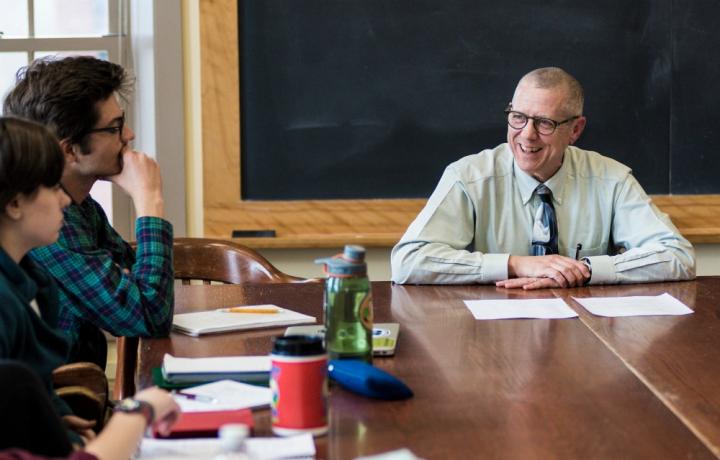Bob Pepperman Taylor new book published by Notre Dame Press

Credit: UVM Photo
BURLINGTON – Bob Pepperman Taylor, the Elliott A. Brown Green and Gold Professor of Law, Politics and Political Behavior at the University of Vermont, says he never intended to be a Thoreau scholar.
“In my first book on environmental ethics, Thoreau represented one of the traditions I was identifying in the American discourse about environment,” he said. “Then I wrote a book about Thoreau’s political ideas.”
For a scholar who specializes in political theory, American political thought and environmental ethics, perhaps it’s not surprising that Taylor’s scholarship often leads back to Thoreau, one of America’s original environmentalists and political thinkers. Taylor’s latest book Lessons from Walden: Thoreau and the Crisis of American Democracy was published this month by the University of Notre Dame Press.
The book addresses two crises that have become especially urgent in the Trump era: threats to democratic norms and political institutions, and dangers to the environment driven by climate change.
“One of things I’m interested in is how democratic thinkers propose to protect democracy from its own vices,” Taylor said. “My proposal was to write a book on nature, religion, education, and populism, and how all of these have been promoted in various ways in the American tradition as protections from democracy’s pathologies. When I wrote the first chapter it became its own book about the lessons Walden gives us, the way these lessons resonate through present time in the U.S, and whether or not those lessons are useful.”
Taylor grapples with a particular problem of democracy dating as far back as antiquity. Plato was concerned that citizens in a democracy wouldn’t have the knowledge or character for responsible self-government. The American founding fathers, Taylor says, shared the fear of the “mischief of factions.”
“Their solution was to form a republic so no one branch of government could take over,” Taylor explains. “The language of the founders portrayed a political machine that would ‘go of itself’–they were animated by the idea that we can’t reform human beings, so we need to design a political machine to correct human imperfections.”
But Taylor notes that in Thoreau’s time, the turbulent Jacksonian period, the machine was insufficient in controlling factions, which led prominent Whigs and reformers like Horace Mann to call for comprehensive public education to insure that Americans could act and vote as disciplined, judicious citizens.
“He (Mann) wasn’t alone–the idea began to emerge that public schooling was critical for democracy,” Taylor said. “We see leaders trying to promote civil virtue in a society that wasn’t very virtuous. It reflected the degree of anxiety about leaving government in the hands of citizens.”
What would Thoreau say about the latest rise of populism and threats to the environment? Taylor notes that Thoreau, the ultimate individualist who was always distrustful of political movements and parties, wouldn’t be the loudest voice in the room.
“One of the points I make is that Walden doesn’t provide prescriptions for political crisis,” he said. “Thoreau isn’t really good for helping us think about crisis management. His contribution helps us think beyond the immediate crisis, to how we can each live as more responsible citizens.”
“A reading of Thoreau for the age of Trump–and really for any moment when our courage as individuals and as a polity seems to be flagging. This is a book that will make you think, and perhaps even act!” –Bill McKibben, author of The End of Nature and Falter
Lessons from Walden is available in hardback and digital editions on March 30, 2020, from the University of Notre Dame Press. For more information, contact: Kathryn Pitts at [email protected]
###
Media Contact
Kevin Coburn
[email protected]
802-656-1247




